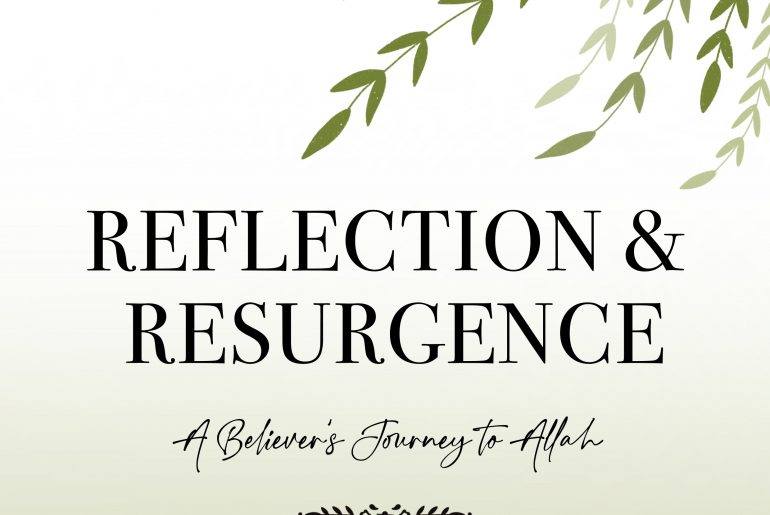Mental health is described by WHO (2001) as: “… a state of well-being in which the individual realizes his or her own abilities, can cope with the normal stresses of life, can work productively and fruitfully, and is able to make a contribution to his or her community.”
In Islam however, there is another addition to the definition. Positive mental health is also related to spirituality, piety and submission to the Almighty.
Allah (S.W.) clearly states in the Qur’an, in Surat Taha, verse 124:
“And whoever turns away from My remembrance-indeed, he will have a depressed (i.e. difficult) life, and We will gather (raise) him on the day of Resurrection blind.”
Thus, when we look into positive mental health, we’d say the first indicator of it is by looking at one’s relationship with God. Do you believe? Do you pray? Do you obey? Allah (S.W) promised to test us with different kinds of worldly tragedies, and within these difficult times, many people give up on God and on life and some entirely become atheists. They forget that life is but a test. So long as a human being keeps reminding themselves that the dunya is but a test and stick to the way of Islam, then Allah (S.W) will definitely grant them ease and strength to keep believing.
Utz (2011) states about the tranquil soul in her book ‘Psychology from an Islamic perspective’ and I quote:
“As sincere faith becomes strong in a person’s heart, the proclivity to evil within the soul becomes weak. The soul becomes completely dominated by inclinations towards piety and righteousness. It loves and desires goodness and detests evil deeds, so it rarely (if ever) responds to or complies with the urges to commit evil deeds. This is the level of the tranquil soul.
(To the righteous it will be said: “O reassured soul, return to your Lord, well-pleased and pleasing to Him. And enter among My righteous servants. And enter My paradise.”)
Goodness dominates, so the soul feels a sense of tranquillity and peace. These souls are obedient to Allah subhanahu wataala and pleased with what He has decreed, relying upon Him alone in all matters. Through this strong connection with the Creator, they calm their desires and passions, and they require little effort to repel evil inclinations. These individuals are in essence fulfilling the purpose of their creation, which is the worship and obedience of Allah. This is a level that is possible to achieve in this life, and it provides the believers with a taste of the joys awaiting them in the hereafter.”
This leads us into another indicator of positive mental health i.e. Acceptance of Allah’s Decree and relying upon Allah alone. One thus knows without a doubt that everything in life has been destined and as much as they can make choices in life, they don’t have total control over what happens. One does their best and prays for the best, believing that Allah (S.W.) will never forsake them. With such mentality, one isn’t unnecessarily overwhelmed, anxious and worried about the future nor are they stuck on the past that is already gone. This reflected in a hadith by Ibn Abbas (May Allah be pleased with them) said:
“One day, I was riding behind the Prophet (ﷺ) when he said, “O boy! I will instruct you in some matters. Be watchful of Allah (Commandments of Allah), He will preserve you. Safeguard His Rights, He will be ever with you. If you beg, beg of Him Alone; and if you need assistance, supplicate to Allah Alone for help. And remember that if all the people gather to benefit you, they will not be able to benefit you except that which Allah had foreordained (for you); and if all of them gather to do harm to you, they will not be able to afflict you with anything other than that which Allah had pre-destined against you. The pens had been lifted and the ink had dried up”. [At- Tirmidhi].
In another hadith, the prophet peace be upon him said, “Amazing is the affair of the believer. This is because there is good for him in every matter and this is not the case with anyone other than the believer. When he is in a state of happiness, he is thankful to Allah, and within that is good for him, and if he is harmed, then he keeps to being patient and thus there is good for him in that.”
This in turn, also makes one resilient such that, whenever a tragedy befalls them, they don’t allow the situation to break them. They adjust to whatever changes that come by and soldier on.
The prophet (p.b.u.h) as our guide, he led us to the path of purification of the soul, self-control and balance. And when one inclines to this path, they feel no distress within themselves. Good mental state can be achieved by avoiding negative attributes like anger, greed, envy and so on.
This means that a person with positive mental health is known to have good virtues such as kindness, forgiveness, compassion and humility which in fact improve one’s quality of life. The prophet (p.b.u.h) said for example that whoever is deprived of kindness then they have been deprived all that is good. And truly, when we think of it, what is the world without kindness?
Gratitude is another important virtue and an indicator as well. When one is thankful, they tend to be more optimistic and more positive towards life, others and even themselves. Studies prove that expressing gratitude improves ones sense of wellbeing and that it makes people be more open, less neurotic and more agreeable. (McCullough et al., 2002)
Apart from that, more positive outcomes have been identified in practicing gratitude as per psychology research. One of the benefits of gratitude is that it can reduce levels of stress. (Krause, 2006) and that it can also decrease the levels of depression and anxiety. (Kashdan & Breen, 2007)
In a study done by Seligman, Steen and Peterson (2005), the participants were given one week to write and deliver in person, a letter of gratitude to someone who had shown special kindness to them that they hadn’t thanked properly. The results showed that participants who took part in the letter-writing reported more happiness for one month after the exercise compared to a control group.
Algoe et al. (2010) asked sixty-seven couples to keep a diary for two weeks and record their own and their partner’s thoughtful actions, the relationship well-being and their emotions. By connecting the data of the couple, they were able to see whether a thoughtful action of the participant was recognized by the partner and whether they acknowledged the action accordingly. They found that a partner’s thoughtful action predicted an increase in feelings of gratitude and indebtedness.
When we thank Allah and others for the good in our life, we avoid focusing on the bad things that happened to us, and thus have a more positive outlook and mental being. Allah (S.W.) says in Surat Ibrahim, verse 7: “If you are grateful, I will surely increase you in favour.”
We can deny it all we want but many research has proved that our spirituality does have an impact on mental health. And more than that, Allah (S.W.) already informed us of that, centuries ago. For us to acquire the peaceful life we desire, we need to embrace the good virtues and follow the prophet (p.b.u.h) for he is the best example and role model.
REFERENCES
1. Algoe, S. B., Gable, S. L. & Maisel, N. C. (2010). It’s the little things: Everyday gratitude as a booster shot for romantic relationships. Personal Relationships.
2. Kashdan, T.B., Breen, W.L. (2007). Materialism and diminished well-being: Experiential avoidance as a mediating mechanism. Journal of Social and Clinical Psychology.
3. Krause, N. (2006). Gratitude toward god, stress, and health in late life. Research on Aging.
4. McCullough, M. E., Tsang, J. -A., & Emmons, R. A. (2004). Gratitude in intermediate affective terrain: Links of grateful moods to individual differences and daily emotional experience. Journal of Personality and Social Psychology.
5. Seligman, M. E. P., Steen, T. T., Park, N., & Peterson, C. (2005). Positive psychology progress: Empirical validation of interventions. American Psychologist.
6. Utz, A. (2011). Psychology from the Islamic Perspective. Riyadh, Saudi Arabia. International Islamic Publishing House.
7. WHO. (2001). The world health report 2001. Mental health: New understanding. New hope. Geneva, World Health Organization.
8. Qur’an. Retrieved from https://quran.com

Semeni ameeeeeen
On that note, if you wish to gift someone else a copy of the book, please buy another copy for them and do not share yours.




 I hope this pandemic ends soon wallahy. So many people are affected. So many people are struggling. So I’m praying that by eid all this will be over, at least people can have some part of ramadhan back in the masjid, may He help us all and protect us. Ameen. Try to make the best out of this Ramadhan as I strive to do as well biidhnillah. Also, you should try watch ‘Qalby Etmaan’ on youtube this Ramadhan cause Ghayth is absolutely my hero when it comes to charity and he inspires me too much *I am still crying*. Perhaps he’d inspire you too!
I hope this pandemic ends soon wallahy. So many people are affected. So many people are struggling. So I’m praying that by eid all this will be over, at least people can have some part of ramadhan back in the masjid, may He help us all and protect us. Ameen. Try to make the best out of this Ramadhan as I strive to do as well biidhnillah. Also, you should try watch ‘Qalby Etmaan’ on youtube this Ramadhan cause Ghayth is absolutely my hero when it comes to charity and he inspires me too much *I am still crying*. Perhaps he’d inspire you too!
